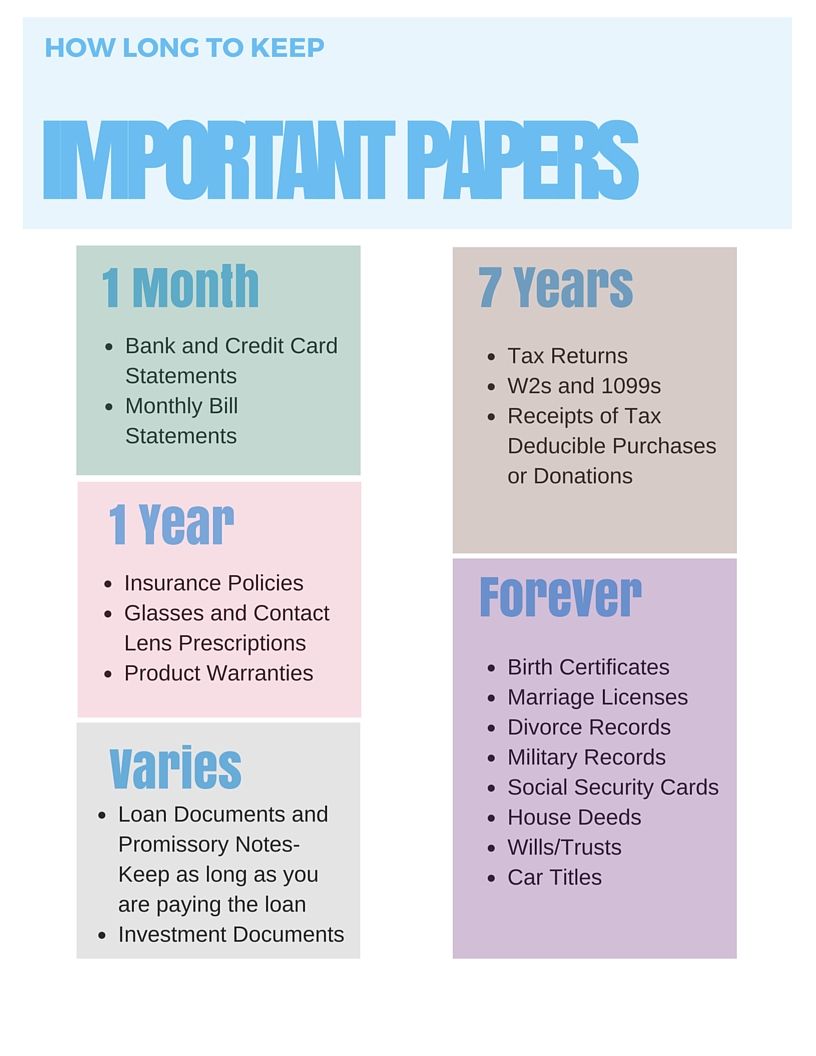Essential Paperwork: How Long Should You Keep It?

Understanding how long to keep essential paperwork is crucial for both personal and business management. Retaining documents for the appropriate duration not only ensures compliance with laws but also aids in resolving potential disputes, maintaining records for tax purposes, and managing personal financial affairs. In this comprehensive guide, we'll explore how long you should retain various types of documents, categorized for clarity and ease of reference.
Why Keep Documentation?

Before we delve into the specifics of retention periods, it's important to understand why retaining paperwork is necessary:
- Legal Compliance: Many jurisdictions require the retention of specific documents for tax audits or legal proceedings.
- Record Keeping: Keeping records helps in financial planning, tracking business transactions, and verifying personal transactions.
- Historical Reference: Past documents can be invaluable for understanding trends or resolving disputes that may arise over time.
Personal Documents

1. Tax Returns

The IRS suggests retaining tax records for at least seven years. However, if you underreported income by more than 25%, there’s no statute of limitations, and you might need to keep them indefinitely.
2. Real Estate Records

Keep property deeds, mortgage records, and home improvement receipts for as long as you own the property, plus six years after selling.
3. Wills and Trust Documents

These should be kept for as long as they are in effect, which is usually indefinitely. After the executor of the estate has completed their duties, these documents should be passed along to the beneficiaries.
4. Medical Records

- Health Insurance Policies: Keep these for at least five years after the policy expires.
- Bills and Receipts: You should retain them for three to five years to help with tax deductions or medical history tracking.
5. Insurance Documents

Hold onto insurance policies for the duration of coverage plus three to five years, as they can be essential for claims, audits, or legal disputes.
6. Investment Records

Retain records of buying, selling, and dividends from investments for at least six years after the transaction year.
Business Documents

1. Financial Statements

Keep annual financial statements permanently; however, interim statements can be discarded after two years.
2. Employment Records

- Payroll Records: Keep these for at least four years due to the IRS requirements.
- Personnel Files: Retain for seven years after employment ends.
3. Bank Statements, Receipts, and Cancelled Checks

Maintain these for seven years for potential audits or business deductions, although IRS suggests keeping them indefinitely.
4. Sales and Purchase Receipts

These should be kept for at least three years for tax purposes or warranty claims.
Additional Tips for Document Storage

1. Digital Backup
Consider digitizing important documents to save space and improve accessibility.
🔐 Note: Always use secure, encrypted storage solutions to protect your digital documents.
2. Use a Retention Schedule
Implement a retention schedule to systematically manage document disposal:
| Document Type | Retention Period |
|---|---|
| Tax Returns | 7 years |
| Real Estate Records | 6 years after sale |
| Employment Records | 4-7 years |

3. Regular Audit
Perform regular audits to ensure documents are kept for the necessary periods and dispose of outdated or unnecessary documents securely.
Organizing and managing essential paperwork can seem overwhelming, but by adhering to these guidelines, you can streamline your record-keeping process, ensure compliance, and protect your personal and business interests.
🌟 Note: Always check with your local regulations, as they might differ from general guidelines mentioned here.
In closing, it's paramount to understand that the length of time to keep paperwork varies by document type and purpose. By adopting a disciplined approach to document retention, you not only safeguard your records but also simplify your administrative tasks over time. Remember, the key to efficient record keeping is not just about knowing when to keep documents but also recognizing when it's safe to let them go. This ensures your records remain relevant, current, and easy to manage for years to come.
How should I dispose of sensitive documents?
+Sensitive documents like bank statements or medical records should be shredded or disposed of through professional services to prevent identity theft or fraud.
Can I keep digital copies only, or do I need hard copies?
+While digital copies are sufficient for many purposes, some legal or official documents might still require hard copies. Always verify with local laws or regulatory bodies.
What do I do if I’m unsure about the retention period for a document?
+When in doubt, consult with a legal or financial advisor, or refer to governmental or regulatory guidance documents specific to your jurisdiction.



